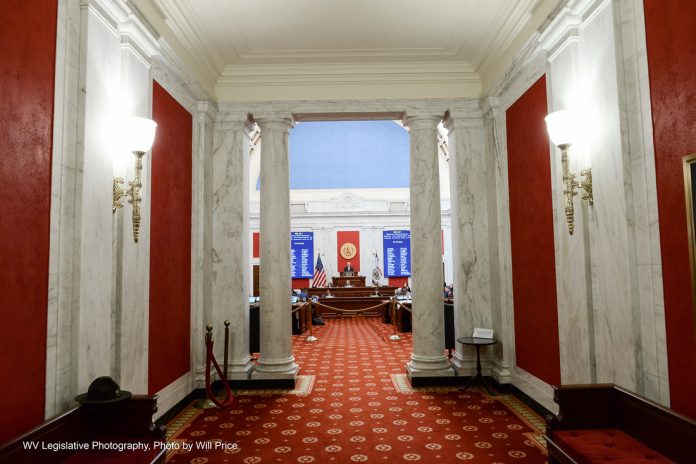During the first session of the 86th Legislature, 333 bills completed the legislative process. Of the 333 bills, 203 were House Bills and 130 were Senate Bills. Thus far, the Governor has signed 109 bills and 2 became law without signature. For a PDF list of completed legislation, please see Completed Legislation of the 2023 Regular Session.
Here are 65 Senate Bills, which completed the legislative process:
Senate Bill 4 authorizes the Division of Natural Resources to establish an Adopt-A-Trail program allowing volunteer groups to assist the division in the maintenance and enhancement of trails on state-owned land. The program would be similar to the Adopt-A-Highway and Adopt-A-Stream programs.
Senate Bill 10 allows persons who are holders of concealed handgun permits to carry same on the campuses of the state institutions of higher education.
Senate Bill 47 creates the Charter Schools Stimulus Fund to be used to provide financial support to charter school applicants and charter schools that do not have resources for start-up costs.
Senate Bill 51 requires an impact statement on a school closing or consolidation before any final decision to close or consolidate a school.
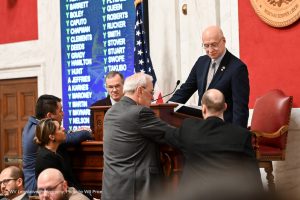 Senate Bill 83 allows a tactical medical professional to carry firearms while on duty in the same manner and to the same extent as law enforcement. A tactical medical professional is an EMS personnel, nurse, physician, osteopathic physician, and physician assistant who is trained and certified in a nationally recognized tactical medical training program.
Senate Bill 83 allows a tactical medical professional to carry firearms while on duty in the same manner and to the same extent as law enforcement. A tactical medical professional is an EMS personnel, nurse, physician, osteopathic physician, and physician assistant who is trained and certified in a nationally recognized tactical medical training program.
Senate Bill 89 requires all hospitals in the State to have healthcare providers trained and properly qualified by the Sexual Assault Forensic Examination Commission to conduct examinations on call during all hours of operation.
Senate Bill 99 allows county boards of education to meet to discuss the consolidation of school districts or the possibility of sharing administrative, coordinating, and other county-level services and functions between them.
Senate Bill 121 creates specific first amendment protections for high school, college, and university student journalists to determine news, opinions, features, or other content irrespective of whether the student is using school facilities or supported financially by the school.
Senate Bill 128 allows the Governor or Legislature to proclaim or declare a state of preparedness or emergency. The state of preparedness may last only 30 days and the state of emergency may last only 60 days unless the Legislature convenes and approves to extend them.
Senate Bill 131 allows municipal fire departments to award service weapons to municipal fire marshals and deputy fire marshals upon retirement after 20 years, or under if leaving on disability.
Senate Bill 132 clarifies that stalking and harassment are separate criminal offenses. A person convicted of stalking is guilty of a felony and is subject to 2 to 10 years imprisonment.
Senate Bill 136 requires individuals convicted of sexual offenses to undergo psychological or psychiatric testing and have a treatment plan in place to be eligible for parole. The bill also expands the list of offenses that would prohibit a defendant from residing with minor children or having contact with victims.
Senate Bill 142 eliminates the publication requirement for estate closing settlements and instead requires the Fiduciary Supervisor to mail a copy of the document to each beneficiary with a notice that a beneficiary has 10 days in which to contest the closing.
Senate Bill 143 requires any participant 17 years of age or younger must be accompanied by an adult for the Adopt-A-Stream Program. The bill grants the DEP discretion to accept or reject requests to adopt streams and rivers.
Senate Bill 146 amends code to align the Peer-to-Peer (PTP) Car Sharing Program, which is a program or business platform which connects vehicle owners to individuals who want to rent vehicles, with the rental car industry.
Senate Bill 149 exempts properties used for divine worship and the operation of a pre-K school, primary school, middle school, secondary school, daycare center, or church camp for children, which school, daycare center, or church camp is operated by the church which owns the property or is operated by another not-for-profit organization or entity from taxation.
Senate Bill 151 authorizes a “pass-through entity” to elect to be subject to the WV Personal Income Tax. A “pass-through entity” is defined as a partnership or other business entity that is not subject to the WV Corporate Net Income Tax. The bill creates a new tax credit against WV PIT for taxpayers who own an electing pass-through entity.
Senate Bill 161 authorizes the director of DNR to sell, lease, or otherwise dispose of property under his or her jurisdiction and control. The bill also authorizes the director to accept money, security, or real and personal property including lands and waters which are suitable for the purposes of the division.
Senate Bill 162 authorizes the DNR Director to lease and develop pore spaces underlying state forests, natural and scenic areas, wildlife management areas, and other lands under DNR control for carbon sequestration.
Senate Bill 187 makes it a felony offense for any public or private school employee to engage in sexual intercourse, sexual intrusion, or sexual contact with any student regardless of the student’s age. The bill states that consent for the act or occurrence off school property or at a time other than during a school function is not a defense. The penalty for anyone convicted of this offense is not less than 1 nor more than 5 years in prison, and/or a fine of up to $5,000, and includes the permanent forfeiture of any teaching or other certificate.
Senate Bill 188 creates the “Grid Stabilization and Security Act” and directs the Department of Economic Development to identify economically viable sites for the development of natural gas electric generation projects that are located near convenient and sufficient supplies of natural gas and are likely to create projects that provide economic benefits to local and state government and citizens of the state.
Senate Bill 191 states that persons whose cases are being dealt with through both “pretrial diversions” and “deferred adjudications” are liable for any applicable court costs, and payment thereof shall be a condition of the deferred adjudication agreement once they are placed into community corrections.
Senate Bill 200 allows leashed dogs to track wounded deer, elk, turkey, bear, and wild boar when hunting.
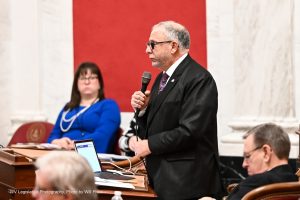 Senate Bill 205 authorizes special registration plates and establishes fees for the plates. The bill authorizes the suspension of registration of any owner who displays a damaged or illegible plate or otherwise fails to comply with a legal requirement. The bill also allows for voiding the plates if there is an issue with renewal.
Senate Bill 205 authorizes special registration plates and establishes fees for the plates. The bill authorizes the suspension of registration of any owner who displays a damaged or illegible plate or otherwise fails to comply with a legal requirement. The bill also allows for voiding the plates if there is an issue with renewal.
Senate Bill 207 eliminates the maximum allowable state allocation from the West Virginia Department of Economic Development to eligible regional councils for purposes of obtaining federal matching grants.
Senate Bill 208 requires all current law-enforcement officers to receive training for appropriate interactions with and in response to persons with autism, Alzheimer’s, and related dementias every three years.
Senate Bill 220 adds regulations to Hemp-derived cannabinoids and Kratom. The bill limits the sale to people 21 years of age or older, authorizes the ABCA Commission to enforce regulations, imposes an excise tax of 11% on the products, and creates new criminal offenses for individuals under 21.
Senate Bill 231 transfers the administration of the West Virginia Small Business Innovation Research and Small Business Technology Transfer Matching Funds Program from the Department of Commerce to the Department of Economic Development.
Senate Bill 232 creates a multi-disciplinary study group to make recommendations to the Legislature about dealing with persons with disabilities in the criminal justice system.
Senate Bill 237 provides a one-time supplemental payment of $1,500 to retired individuals of PERS and TRS who are 70 years or older, have at least 20 years of service, and have a monthly annuity payment of less than $1,000. The bill also increases the minimum annuity payment for retired individuals of PERS or TRS who are 70 or older, have 25 or more years of service, and have a monthly annuity payment of less than $1,000.
Senate Bill 239 requires the Commissioner for the Bureau for Behavioral Health to conduct a study among behavioral health providers, substance abuse disorder providers, municipal leaders, and county government leaders to obtain a breakdown of various demographics within the homeless community throughout the State of West Virginia.
Senate Bill 240 modifies the requirements of Chapter 30 board applicant registries available to the public. The bill mandates that boards maintain a website with the names of board members and staff, contact information for them, copies of minutes of board meetings, and notice of upcoming meetings.
Senate Bill 241 makes the investigation and enforcement of the Patient Brokering Act the responsibility of the Office of Health Facility Licensure and Certification (OHFLAC) It requires OHFLAC to develop a tool to facilitate public complaints about the Patient Brokering Act.
Senate Bill 244 requires any state entity that licenses, certifies, or otherwise authorizes an individual to practice a profession, trade, or occupation to make a roster of those authorized individuals available to the public and electronically if the entity has a website.
Senate Bill 246 revises the membership of the Broadband Enhancement Council to reflect the loss of a congressional district, decreasing the membership from 13 to 11.
Senate Bill 247 makes appeals of final board action subject to the Administrative Procedures Act with appeals to be fined to the Intermediate Court of Appeals.
Senate Bill 258 removes the $10,000 limit on the maximum fair market value for single-item rent-to-own.
Senate Bill 267 requires PEIA and Medicated to provide electronic portals for the submission of prior authorization forms.
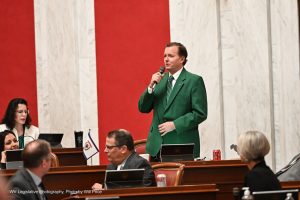 Senate Bill 268 requires all PEIA board members to complete fiduciary training, as members will have a fiduciary responsibility to protect plan assets for participants. It requires the finance board to hold at least two public hearings on proposed financial plans. The finance board may only use revenue estimates from the governor as needed to maintain an actuarially recommended reserve fund and to maintain premium cost-sharing. The director may not incorporate other revenue sources into the plan.
Senate Bill 268 requires all PEIA board members to complete fiduciary training, as members will have a fiduciary responsibility to protect plan assets for participants. It requires the finance board to hold at least two public hearings on proposed financial plans. The finance board may only use revenue estimates from the governor as needed to maintain an actuarially recommended reserve fund and to maintain premium cost-sharing. The director may not incorporate other revenue sources into the plan.
The bill requires plans to reimburse WV hospitals at a minimum rate of 110 percent of Medicare. Plans for employees and retired employees shall be at a cost-sharing rate of 80 percent for the employer and 20 percent for the employees. PEIA will maintain the 80-20 cost-sharing for instate and out-of-state in contiguous counties and then drops to 70-30 coverage for other out-of-state providers.
All plans shall include coverage for diagnosis, evaluation, and treatment for autism spectrum disorder for ages 18 months to 18 years. Coverage through PEIA includes children’s immunizations from birth to 16 for diphtheria, polio, mumps, measles, rubella, tetanus, hepatitis-b, hemophilia influenza-b, and whooping cough. Coverage includes a 12-month refill for contraceptives and group life and accidental death insurance for $10,000 for each employee.
The bill makes a change to spousal coverage through PEIA. If an employee’s spouse has health insurance available through their employer, then they are will not be covered under PEIA unless the employee adds the spouse to the plan by paying an additional $147 a month.
Senate Bill 270 provides an exemption from the requirement to secure a permit to have a body cremated for representatives of institutions who are arranging the cremation of the body of an individual who has donated his or her body to science.
Senate Bill 271 allows nominees for the First Responders Honor Board to be considered by the Legislature at times other than its next regular session.
Senate Bill 273 reallocates existing child protective service workers throughout the state based on the population in the 2020 Census.
Senate Bill 275 adds State Fire Marshals to the list of persons who receive school safety information.
Senate Bill 276 allows the State Fire Marshal to award the service weapon of a retiring State Fire Marshal, any full-time deputy fire marshal, or any full-time assistant fire marshal employed by the State Fire Marshal to the retiree without charge when the retiring member honorably retires with at least 10 years of service or with less than 10 years of service based upon the determination that the retiring employee is totally physically disabled as a result of service with the State Fire Marshal.
Senate Bill 294 clarifies that deputy sheriffs receive an annual monetary payment in the amount of $5 per month of service (increasing at a rate of $60 per year) – with the payments and calculations starting after their first year of service.
Senate Bill 298 allows local emergency services entities to enter into mutual aid agreements with fire and emergency medical services located in border counties of contiguous states for day-to-day cooperation.
Senate Bill 300 modifies the definition of “law-enforcement officer” to clarify that a county litter officer who has not received training and been certified as a law-enforcement officer is not considered a “law-enforcement officer”.
Senate Bill 302 requires West Virginia law enforcement agencies to index felony warrants with the National Crime Information Center of the FBI.
Senate Bill 335 authorizes agencies within the Department of Homeland Security to create legislative rules relating to law enforcement response to domestic violence, the National Flood Insurance Program, hazardous substance emergency response training program, certification of home inspectors, volunteer firefighters’ training equipment, and operating standards, certification of electrical inspectors, supervision of fire protection work, electrician licensing, WV State police standards, and modified vehicle inspections.
Senate Bill 345 authorizes agencies within the Department of Revenue to create legislative rules relating to money transmission services, suitability in annuity transactions, pharmacy auditing entities and pharmacy benefits managers, bail bondsmen in criminal cases, WV Lottery sports wagering, valuation of producing and reserve oil, natural gas liquid and natural gas for property tax purposes, WV Film Industry Investment Act, Farm to Food Bank tax credit, property transfer tax, municipal sales and use tax administration and personnel rule.
Senate Bill 356 authorizes agencies within the DOR to create legislative rules relating to administrative due process; examination and issuance of driver’s licenses; denial, suspension, revocation, disqualification, restriction, nonrenewal, cancellation, administrative appeals, and reinstatement of driving privileges; disposal, lease, and management of real property and appurtenant structures and relocations assistance; and organization and meetings repeal of the State Rail Authority.
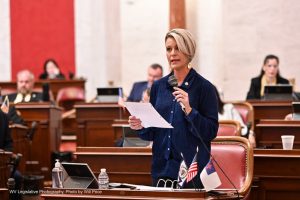 Senate Bill 361 authorizes various boards and agencies to create legislative rule including the Board of Accountancy on board rules of professional conduct; Board of Acupuncture on advertising by licensed acupuncturists, standards of practice, and continuing education requirements; the Department of Agriculture on apiary rule, fruit inspection schedule, noxious weeds, Grade “A” pasteurized milk, inspection of nontraditional, domesticated animals, hemp products, livestock care standards, farm-to-food bank tax credit, and famers markets; the Athletic Commission on administrative rules and regulation of mixed martial arts; the State Auditor on standards for voluntary payroll deductions; the Conservation Agency on operation of West Virginia State Conservation Committee and conservation district and conservation district accounting and auditing standards; the Board of Dentistry on dental recovery networks; the Board of Funeral Service Examiners on funeral director, embalmer, apprentice, courtesy card holders, and funeral establishment requirements, crematory requirements, and fee schedule; the Board of Landscape Architects on registration of landscape architects; the Board of Medicine on licensing of physicians and podiatric physicians and disciplinary procedures for applicants, licensees, and credential holders, licensure, practice requirements, disciplinary and complaint procedures, continuing education, physician assistants, collaborative pharmacy practice, and prohibiting sexual misconduct by health care practitioners; the Board of Optometry on optometric telehealth practice; the Board of Osteopathic Medicine on osteopathic physician assistants; the Board of Pharmacy on licensure and practice of pharmacy, the Uniform Controlled Substance Act, rules for registration of pharmacy technicians, regulations governing pharmacy permit, inspections, and the Donated Drug Repository Program; and Board of RPNs on requirements for registration and licensure and conduct constituting professional misconduct, advanced practice registered nurse licensure requirements, limited prescriptive authority for nurses in advanced practice, continuing education and competence, fees for services rendered by the board, practitioner requirements for accessing the West Virginia Controlled Substance Monitoring Program database, and telehealth.
Senate Bill 361 authorizes various boards and agencies to create legislative rule including the Board of Accountancy on board rules of professional conduct; Board of Acupuncture on advertising by licensed acupuncturists, standards of practice, and continuing education requirements; the Department of Agriculture on apiary rule, fruit inspection schedule, noxious weeds, Grade “A” pasteurized milk, inspection of nontraditional, domesticated animals, hemp products, livestock care standards, farm-to-food bank tax credit, and famers markets; the Athletic Commission on administrative rules and regulation of mixed martial arts; the State Auditor on standards for voluntary payroll deductions; the Conservation Agency on operation of West Virginia State Conservation Committee and conservation district and conservation district accounting and auditing standards; the Board of Dentistry on dental recovery networks; the Board of Funeral Service Examiners on funeral director, embalmer, apprentice, courtesy card holders, and funeral establishment requirements, crematory requirements, and fee schedule; the Board of Landscape Architects on registration of landscape architects; the Board of Medicine on licensing of physicians and podiatric physicians and disciplinary procedures for applicants, licensees, and credential holders, licensure, practice requirements, disciplinary and complaint procedures, continuing education, physician assistants, collaborative pharmacy practice, and prohibiting sexual misconduct by health care practitioners; the Board of Optometry on optometric telehealth practice; the Board of Osteopathic Medicine on osteopathic physician assistants; the Board of Pharmacy on licensure and practice of pharmacy, the Uniform Controlled Substance Act, rules for registration of pharmacy technicians, regulations governing pharmacy permit, inspections, and the Donated Drug Repository Program; and Board of RPNs on requirements for registration and licensure and conduct constituting professional misconduct, advanced practice registered nurse licensure requirements, limited prescriptive authority for nurses in advanced practice, continuing education and competence, fees for services rendered by the board, practitioner requirements for accessing the West Virginia Controlled Substance Monitoring Program database, and telehealth.
Senate Bill 409 authorizes agencies within the Department of Commerce to create legislative rules relating to the Small Business Innovation Research and Small Business Technology Transfer Matching Funds Program, West Virginia Board of Manufactured Housing Construction and Safety, supervision of plumbing work, regulation of heating, ventilating, and cooling work, registration of service persons and service agencies, registration of weighing and measuring devices, commercial whitewater outfitters, special motorboating regulations, and permits and licenses.
Senate Bill 422 requires each public-school county-adopted class curriculum to be posted on the school’s website at the beginning of each school year and the revised curriculum to be posted within 30 business days.
Senate Bill 423 increases the annual salaries of members of the West Virginia State Police, public school teachers, and public-school service personnel beginning July 1, 2023.
Senate Bill 430 clarifies that the Department of Revenue’s exemption from procedural oversight by the Treasurer’s Office does not equate to an exemption from the State Treasurer’s contract authority.
Senate Bill 439 creates a “Design-Build Pilot Program” to be administered by the Department of Environmental Protection. The program will allow DEP to expedite infrastructure projects by combining the design and construction elements of a proposed project into a single contract.
Senate Bill 443 directs payment of funds from fees charged at the time of qualification of a fiduciary to the State Auditor.
Senate Bill 444 ends the WV Future Fund and transfers the money to the General Revenue Fund.
Senate Bill 446 removes methanol and methanol fuel from the definition of special fuel for purposes of the motor fuel excise tax.
Senate Bill 449 updates the government employee retirement systems to include Natural Resources Police Officers and public charter school employees.
Senate Bill 450 requires medical examinations to be performed either in person or virtually by a physician approved by the board when approving disability awards and benefits for members of the West Virginia Public Employees Retirement System, the Deputy Sheriffs’ Retirement System, the Municipal Police and Firefighters Retirement System, the State Police Retirement System, the Emergency Medical Services Retirement System, the Teachers Retirement System, and the Natural Resources Police Officers Retirement System.
Senate Bill 451 updates the definitions to reflect that public charter schools may elect to participate in the teachers’ retirement systems
Senate Bill 452 adds 911 personnel and county firefighter to those who can contribute and receive benefits from the EMS Retirement System.
Senate Bill 453 provides for successor liability and delinquent retirement contributions for public charter schools.

